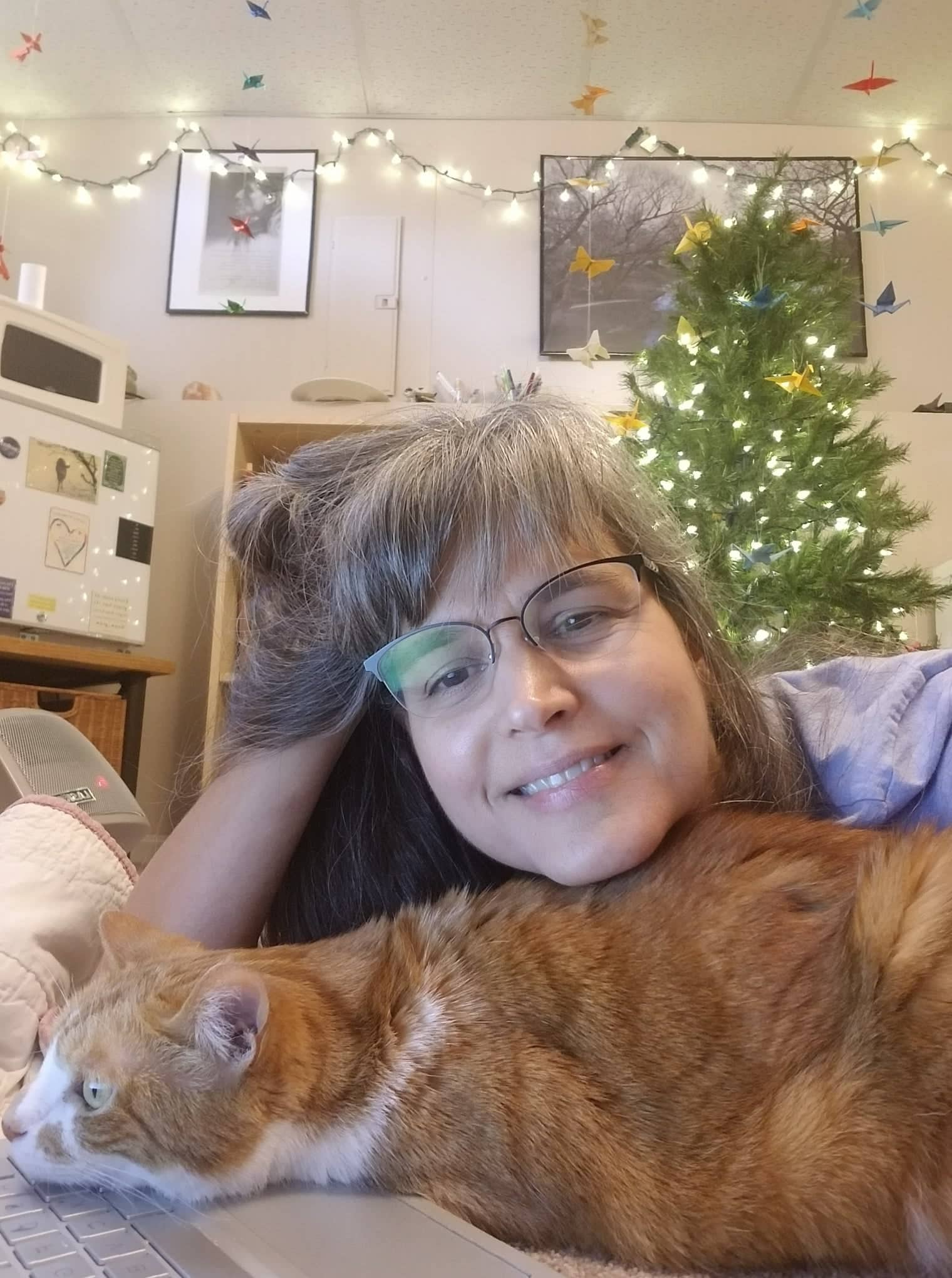
Sophie is calmly relentless when she wants something.
She’ll make her move when I’m distracted, inching closer to the plate I just set down on the coffee table, for just a taste. She’s more obvious when it’s a lap she wants to crawl into. When she seems to stop trying, it’s just for stealth or dramatic effect. She’ll be back at it. She’s a cat, by the way.
I’m beginning to act like her where Elephant Academy is concerned. Courses may end, and I’ll go away for a while, but I just keep showing up again, hungry and wanting connection.
For Elephant Journal’s birthday, I’d like to offer a small token of my appreciation, in writing, of course. It’s a birthday present and a thank you note. It’s both. That fits.
There’s a generosity of spirit floating around the EJ community, which blurs the usual distinctions between giving and receiving. That reminds me of a line in a Rumi poem about places where “the phrase ‘each other’ doesn’t make any sense.” Check out what I just found, googling a few words to get the quote right. It’s an EJ article of course: The Rumi Poem we should all Read.
My heart just quickens when I move in closer to the EJ community, and so do the coincidences that show up in my life. That’s true whether I’m reading articles, writing one, joining an online gathering in a pandemic, or taking another class with Elephant Academy. They’re not magicians, exactly. They’re writers and editors, the real deal. They do cultivate conditions that allow magical things to happen, though. It’s like a field of dreams for writers.
I can’t guess how many articles I read that helped me before I noticed a common denominator: published by Elephant Journal.
I once clicked on a Facebook live notification to find Waylon Lewis talking about his book Things I Would Like to Do With You. I didn’t know who he was then, but I tuned in for a few minutes, intrigued with the idea of a Buddhist perspective on relationships. The vibe of the conversation was intimate yet open and inclusive, like a café I’d like to return to sometime, full of strangers who might become friends.
A year or two later, an email appeared in my inbox with some Elephant Academy offerings. The options included a bundle of two classes, a discount, and a tagline about making money doing something you love. The idea of getting paid to write was enticing, but that seemed out of reach for me. The community of mindful writers is what really attracted me. The timing was perfect. I was feeling tired from my side hustle. I needed a lift. It’s like an elevator door of sorts was opening before me, with a silent question and invitation, “Going up?”
I signed up, and another Rumi quote came to mind that resonated so much with how I felt. “When you do something from your soul, you feel a river moving in you, a joy.”
I’d been isolating for a while at that time, starting anew after a divorce. I’d left most of my old life behind. I was okay, I was making it, but not quite thriving. My cocoon was getting cramped. I wanted to wriggle out, to live a little, but I wasn’t sure how to go about it. I needed a certain kind of environment to spread my wings, and Elephant Academy fit the bill—a community grounded in integrity, offering a whirlwind of support, inspiration, and encouragement, mixed with specific tips on how to be a better writer. With a net like that, I leapt, and waited for my wings to appear.
Did you know that a butterfly is supposed to struggle out of its cocoon for its wings to be able to grow, so it can fly? It’s not an obstacle, it’s a necessary part of the process. That struck me as the best human development metaphor ever, especially with the grounding in science. I found that lovable nugget—you guessed it—in an EJ article: The Beauty in Goodbye.
Anne Lamott said, “You own everything that happened to you. Tell your stories. If people wanted you to write warmly about them, they should have behaved better.”
I started writing. One piece was published quickly. I was thrilled.
Then a theme emerged in the editors’ feedback, cautioning me about the risk of libel, wondering how to make my piece connect more widely. I dove deeper for what might be more relatable and beneficial to others in my experiences. That yielded a curious perk. I found things helpful for me too, beyond the catharsis of self-expression.
Between rounds of feedback, I revisited some old pain around how my stories landed with others before. I was close to the flame of why I needed to write. The course was Finding Your Voice, but the silence around mine was growing heavy. I slept on it for a night or two. I edited. I latched onto a phrase from the course. “Tell the truth but tell it sideways.” I tried that.
Then an email came with some suggestions and words of kindness in precisely the place I was bracing myself for rejection. “These changes will probably be pretty minor—you’re so close.” My eyes immediately welled. Oh boy, this wasn’t just about writing anymore. The editors were listening for my voice all along, wanting to bring it out.
What a precious lesson. My voice wasn’t in the muck of the bad things that happened to me. Writing, and editing helped me loosen the grip of being identified with traumatic events in the past. My voice was findable in the present. It was somewhere in the space between the details of my life experiences, the encouragement to write about them, and the drive to be of benefit to others.
To call it a corrective emotional experience getting those pieces published would be an understatement. Two of them landed on the ecosystem:
A Psychological Condom for Online Dating: Don’t Feed the Narcissists.
6 Ways to Make Friends with our Awkward, Unspoken Needs.
I won’t lie, that was exciting, especially watching the number of reads exponentially increase. I did get paid, by the way, surpassing my expectations. More than that, my faith in humanity (and my place in it) was restored along the way. Priceless.
When I’m missing the Academy, and losing my writing momentum, I take more classes. I loved Maitri: How to Fall in Love with Your Sweet Self. It worked, I did, and became smitten with Elephant again too. So I applied to be a mentor for another session and connected with some amazing people and writers. Paying forward some of the support I’m so grateful to have received was satisfying. That class just ended, so I’ll rest a bit, but I don’t think I’ll be going away. I’m like a feral cat who has been fed too well for that.
I always loved that Robert Fulghum essay about the lessons of kindergarten. Simple wisdom appeals to me, after many years in ivory towers, with some mixed blessings for me. My feelings about Elephant Journal are unambiguous, they’re more reminiscent of kindergarten warm fuzzies, only with creative mindful inspiring adults.
For your 19th birthday, Elephant Journal, here’s a thank you list of 19 things I learned from you.
1. Everything is connected, and writing reduces the degrees of separation.
2. Your voice isn’t just about you. Someone needs to hear your story.
3. There’s no such thing as too much maitri (loving kindness).
4. Yoga is good.
5. Integrity is sexy.
6. $3/month to read unlimited articles is a steal. That’s about the equivalent of a minute or two of therapy. Do you know how many therapists like myself write for Elephant?
7. Plastic is bad.
8. Calling me Sunshine makes me more receptive to whatever you have to say.
9. The more you put into something, the more you get out of it.
10. Giving and receiving can be more reciprocal than I ever realized.
11. Authenticity connects.
12. Be specific.
13. When you feel a river moving in you, go with that flow.
14. Genuine community can happen online.
15. Writers make the world a better place. They should get paid.
16. Transparency breeds trust.
17. Living and writing feed each other. If I’m out of things to write about, I might need to live a little more.
18. Anything can be inspiring if I’m paying attention.
19. There are always more Elephant Academy classes.
~










Read 45 comments and reply